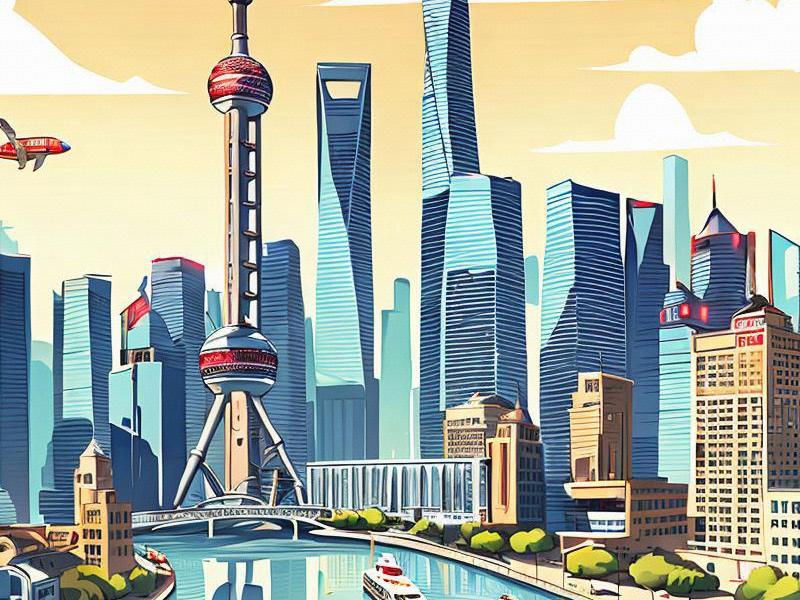
Shanghai's economic growth has been nothing short of remarkable. Over the past few decades, the city has transformed from a traditional port city into a global financial center. The Shanghai Stock Exchange, established in 1990, is now one of the largest stock exchanges in Asia, attracting investors from around the world. The city's skyline is dotted with towering skyscrapers, including the iconic Oriental Pearl Tower and the Shanghai Tower, which is the tallest building in China and the second-tallest in the world.
The Pudong area, once a rural region, has become a symbol of Shanghai's economic transformation. It is home to the Lujiazui Financial District, where some of the world's largest banks and financial institutions have set up their headquarters. The development of Pudong is a testament to Shanghai's ability to adapt and innovate in the face of global economic challenges.
Shanghai's port is another key driver of its economic success. The Port of Shanghai is the busiest container port in the world, handling millions of containers annually. It serves as a vital link between China and the global economy, facilitating trade and commerce on an unprecedented scale.
Culturally, Shanghai is a melting pot of tradition and modernity. The city boasts a rich history that dates back to the Tang Dynasty, when it was known as Hudu. Over the centuries, Shanghai has absorbed influences from various cultures, resulting in a unique blend of Chinese and Western traditions.
The Bund, a historic waterfront area, is a showcase of Shanghai's colonial past. Once lined with British and French concessions, the Bund now features a stunning array of Art Deco buildings that reflect the city's cosmopolitan character. At night, the Bund is illuminated, creating a magical atmosphere that attracts both locals and tourists.
上海龙凤sh419 Nanjing Road, one of the world's busiest shopping streets, is another cultural landmark. It offers a wide range of shopping options, from luxury boutiques to traditional Chinese shops. The street is a vibrant hub of activity, with bustling crowds and a lively atmosphere.
Shanghai's cultural scene is further enriched by its numerous museums, theaters, and art galleries. The Shanghai Museum, for example, is renowned for its extensive collection of Chinese art, including ancient ceramics, calligraphy, and paintings. The city's theaters host a variety of performances, from traditional Chinese opera to contemporary plays and concerts.
Education is another area where Shanghai excels. The city is home to some of the best universities in China, including Fudan University and Tongji University. These institutions attract students and researchers from around the world, contributing to Shanghai's reputation as a center of learning and innovation.
Shanghai's global influence extends beyond its economic and cultural achievements. The city has played a pivotal role in China's integration into the global economy. As a member of the World Trade Organization, Shanghai is committed to promoting free trade and economic cooperation.
上海龙凤419自荐 The city has also been a host to numerous international events, including the World Expo in 2010. The Expo showcased Shanghai's ability to organize large-scale events and its commitment to sustainable development. It attracted millions of visitors from around the world, leaving a lasting impression on the global community.
Shanghai's urban planning and infrastructure are exemplary. The city has invested heavily in public transportation, resulting in an efficient and convenient network of buses, subways, and taxis. The Shanghai Metro, one of the busiest metro systems in the world, connects different parts of the city and facilitates the movement of millions of residents and visitors daily.
The city's green initiatives are also noteworthy. Shanghai has been working to reduce pollution and improve air quality through various measures, including the promotion of electric vehicles and the development of urban green spaces. The city's parks and gardens provide residents with opportunities to enjoy nature and relax amidst the hustle and bustle of urban life.
Shanghai's residents are known for their entrepreneurial spirit and adaptability. The city has a diverse population, with people from all over China and the world living and working there. This diversity has contributed to the city's dynamic and innovative atmosphere.
上海品茶工作室 The younger generation in Shanghai is particularly influential. They are at the forefront of technological advancements and cultural trends, driving the city's growth and development. Many young professionals and entrepreneurs have made Shanghai their home, drawn by the city's opportunities and vibrant lifestyle.
Shanghai's future looks promising. The city is committed to sustainable development and continues to invest in infrastructure, education, and innovation. The Chinese government has outlined plans for Shanghai to become a global leader in science and technology, with a focus on artificial intelligence, biotechnology, and green energy.
As Shanghai continues to grow and evolve, it faces challenges such as managing urbanization, addressing environmental concerns, and ensuring social equity. However, the city's resilience and adaptability have enabled it to overcome obstacles in the past and will likely guide its path forward.
In conclusion, Shanghai is a dynamic metropolis that embodies China's rapid economic development and urbanization. Its economic prowess, cultural vibrancy, and global significance make it a city of immense importance. As Shanghai continues to rise, it will undoubtedly play a crucial role in shaping the future of China and the world.
